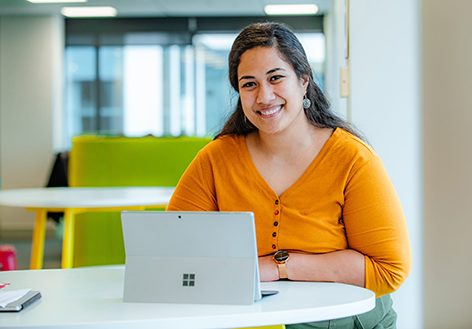Making a social impact with construction engineering
April Faitua decided to become an engineer at a very early age, influenced by her practical father who was always creating something new around the home. She was particularly inspired by the fale tele (a Samoan house used for ceremonies and welcoming guests) that her mum and dad built with the help of family members.
“Every piece of wood was etched with a Samoan pattern and it was made larger than usual. The fale tele is not a particularly complicated structure to build and design but it has much significance to me and my culture,” explains April.
As she grew older, April’s interest in structures increased as she observed different structures around the Pacific and the way her father always took family and community into account when designing.
“We spend a lot of our lives in buildings and are directly shaped by the environments we grow up in. Often they are admired without a thought about how complicated the engineering and team work is. Basically, I wanted to take construction engineering so I could have a hand at contributing in a practical way to the structures that impact us every day.”
Kāinga Ora - Homes and Communities role
After graduating, April got a construction engineering graduate role with New Zealand’s largest public housing landlord, Kāinga Ora - Homes and Communities. Kāinga Ora has a mandate to develop and deliver sustainable public housing and urban development projects to make housing more affordable for New Zealanders and provide warm, dry homes to people in need It does this in partnership with local and central government, iwi, community organisations, and housing providers.
April was part of a core team working with subject matter experts and management consultants to improve the performance and efficiency of public housing developments led by the Crown housing agency.
“The project involved mapping out all of the processes across the organisation. We’ve learned from all the different experts and their teams, within and outside of the organisation, many who have critiqued our maps and findings,” says April.
Working on improving performance and efficiency in the housing delivery system has been a huge project, says April, but one that will increase the pace of homes being built for people in need.
Graduate programme
The 18-month Kāinga Ora Graduate Programme provides graduates with three rotations across various business units, and the opportunity to take up a permanent role in an area of the business they have worked in on completion. April says this contributed immensely to her ability to holistically analyse community and client requirements.
“I had the opportunity to learn about the end-to-end project delivery system and to develop the skills required to manage and plan as a developer in the residential sector. I have been able to experience and contribute towards rotations in Development Management and Portfolio Management and have had the honour to learn from and contribute to some of the best,” she adds.
April was glad to be part of an organisation helping to create social change. When she started her job search April was simply looking for a foot in the door somewhere. But when she started to read up on Kāinga Ora and the housing needs of Aotearoa, she decided she’d love to get into the Kāinga Ora Graduate Programme.
“I knew it wasn’t going to exercise too much of my design skills but I knew it would help shape my construction management, planning and ability to ensure design meets complex needs and land. The wellbeing of our customers is vital to Kāinga Ora and it shows in the people I work with.”
Wealth of skills and experience to draw on
April drew on her construction management planning and design skills regularly.
“Not only has my study given me the background knowledge required for the projects I’ve been working on, but also helped me form my own ways of understanding and solving new problems to achieve objectives.”
April also believes her Samoan upbringing, including her ability to empathise and understand - yet be pragmatic even in very difficult situations - has prepared her well for construction engineering work.
“It taught me how to treat people and how to communicate well. I also believe I bring a holistic view of the world to the table and knowledge of the ways we are all connected which is vital in the world of engineering where we wish to create sustainable solutions that are suitable for the end user. You can’t separate your upbringing and culture from the way you work,” she says.
“I think it is safe to say that all tangata whenua, Micronesian, Melanesian and Polynesian people that have lived/are living in Aotearoa carry a unique knowledge, resilience and the power to drive change through their lived experience.”
April's achievements have been hard won. Before and during the graduate programme, she struggled with PTSD, then lost her father during the pandemic.
“My family has been through a lot and I’m fortunate to be working at a place where I have been well supported through it all. I look forward to continually improving and challenging myself as I grow under the guidance of my amazing mentors and colleagues"
"The road to success is always under construction," says April.
Written by AUT Employability and Careers writer Angela McCarthy
CVs/Cover letters
- 7 Tips on creating a great CV
- Personal Statement? Career Objective? What?
- Why bother with LinkedIn?
- Why bother to write a cover letter?
Job search skills
Career advice
- Bringing passion into the mix
- Don't let rejection end your dream
- Employability Skills - how to figure them out!